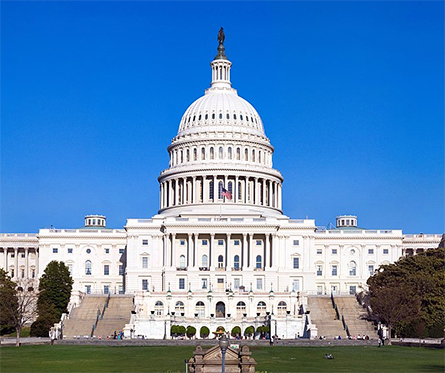2022 science policy priorities
The Public Affairs Advisory Committee of the American Society for Biochemistry and Molecular Biology advocates for government policies that provide flexibility to scientists, ensure the sustainability of American research and support scientists from all backgrounds. Many legislators and policymakers lack scientific training, so science policy advocates must seize opportunities to guide and inform evidence-based policy.

Though not an exhaustive list, here are the policy priorities that the ASBMB PAAC and public affairs staff will focus on in 2022.
Sustainable funding
The PAAC will focus its advocacy efforts on three major issues in federal agency funding: the rising cost of research, the increased administrative burden of the grant process and lack of flexibility within grant mechanisms.
The modular National Institutes of Health grant has not kept pace with inflation, resulting in decreased purchasing power for laboratories. The PAAC is developing recommendations to ensure that grants can support research, such as requiring that the NIH revisit the modular grant budget every 10 years.
Investigators need the flexibility to change research directions so we can continue to capitalize on the federal government’s significant investments in their training. The PAAC will urge the NIH to develop transitional funding opportunities, similar to a recently developed funding mechanism by the National Science Foundation, that allow investigators to train in a new area and then redirect their research with strong promise for impact.
Training the next generation
A shrinking postdoc job market, pandemic challenges, and the mental health burden and high-stress environments faced by early-career scientists are sapping the vitality of American research. The PAAC will focus on policy solutions to address these challenges. Of particular concern are lack of benefits and inconsistent salaries for postdoctoral fellows. Although postdoc salaries have become more standardized in recent years, benefits still vary widely. The PAAC will advocate for other federal funding agencies to adopt the NIH’s salary recommendations and for federal funding to study postdoc management, salaries and benefits all across the country.
A related effort involves working with other stakeholders to address challenges graduate students face, including mental health and food insecurity. A startling number of grad students experience food or housing insecurity, and the pandemic has taken a toll on the mental health and well-being of trainees. Efforts in this space will leverage the ASBMB’s relationships with the NIH to advocate for better support for our most at-risk trainees.
International collaboration
Free collaboration across borders is essential for science to advance, but investigators and institutions must navigate a burdensome patchwork of polices to remain compliant with restrictions on international collaborations. The PAAC will advocate for harmonizing these policies and continued support of international students, scholars and collaboration.
The ASBMB will work to ensure that Deferred Action for Childhood Arrivals, or DACA, students can contribute to the American research enterprise and that immigration policy welcomes anyone who wants to study science in the U.S. The public affairs department has worked closely with federal agencies to improve research security policies without hindering international collaboration and will continue to do so.
Diversity and inclusion
As we work to increase diversity of science faculty at U.S. institutions, we must ensure equity in competition for grants. The PAAC will partner with the NIH Center for Scientific Review to collect data on the diversity of NIH grant reviewers and evaluate whether that diversity reflects goals that move the grant system toward greater equity.
The PAAC also will advocate that the NIH and NSF increase funding for and develop grant mechanisms that provide funding to historically black colleges and universities, minority-serving institutions, primarily undergraduate institutions and emerging research institutions. Diversifying the pool of researchers and institutions receiving federal funding for research will ensure that we are training a diverse pool of undergraduates who will continue in science, technology, engineering and mathematics careers and become future leaders of science.
Enjoy reading ASBMB Today?
Become a member to receive the print edition four times a year and the digital edition monthly.
Learn moreGet the latest from ASBMB Today
Enter your email address, and we’ll send you a weekly email with recent articles, interviews and more.
Latest in Policy
Policy highlights or most popular articles

Women’s health cannot leave rare diseases behind
A physician living with lymphangioleiomyomatosis and a basic scientist explain why patient-driven, trial-ready research is essential to turning momentum into meaningful progress.

Building a stronger future for research funding
Hear from Eric Gascho of the Coalition for Health Funding about federal public health investments, the value of collaboration and how scientists can help shape the future of research funding.

Councilors advocate for science on Capitol Hill
ASBMB Councilors meet with their elected officials to advocate for basic scientific research funding and training the next generation of scientists.

Hope for a cure hangs on research
Amid drastic proposed cuts to biomedical research, rare disease families like Hailey Adkisson’s fight for survival and hope. Without funding, science can’t “catch up” to help the patients who need it most.

Supporting science through advocacy and community building
ASBMB calls on scientists to take action as funding cuts and policy shifts threaten the U.S. research enterprise, emphasizing the power of community advocacy and persistence in protecting the future of science.

Seven steps to advocating in your home state
Find out how to schedule, prepare for and conduct a productive district office meeting to communicate the importance of fundamental scientific research funding to your representatives.

